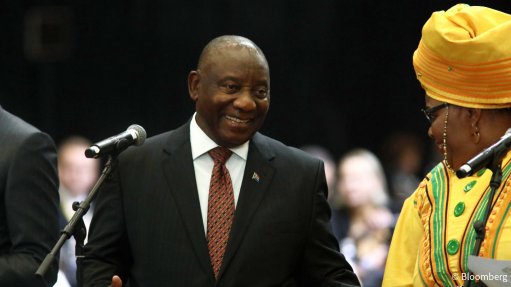
Cyril Ramaphosa
South Africa’s African National Congress and the Democratic Alliance committed to “rapid, inclusive and sustainable” economic growth in an agreement on forming a so-called government of national unity.
The accord, signed in Cape Town on Friday, sets the revival of South Africa’s economy as the first of 11 priorities that the incoming administration will focus on. It touts fixed capital investment, structural reforms and fiscal sustainability as key objectives to getting the economy back on track.
South Africa’s economy has expanded by less than 1% a year on average over the past decade — well below what was needed to maintain living standards for the growing population. The unemployment rate stood at 33% in March, and the income gap between rich and poor is wider than anywhere else in the world, according to available data compiled by the Thomas Piketty-backed World Inequality Lab.
“None of us should expect these problems to be solved overnight,” DA leader John Steenhuisen told an event in Cape Town. “It will take years of sustained hard work.”
Lawmakers are meeting in Cape Town on Friday for the first time since elections on May 29, in which the ANC lost its parliamentary majority for the first time since 1994. That forced the party that ended White-minority rule to seek an alliance with rivals to continue governing.
ANC Secretary-General Fikile Mbalula said on Thursday that in addition to the DA, other parties that support the government of national unity include the Inkatha Freedom Party and the smaller Patriotic Alliance. The parties earlier agreed to back the reelection of Cyril Ramaphosa as president, and candidates for the position of speaker and deputy speaker of parliament.
While the parties to the government of national unity have agreed to basic principles, the next hurdle will be the formation of a cabinet, in which opposition parties are seeking key positions. The bloc has agreed that while cabinet remains Ramaphosa’s prerogative, he will have to consult them before making appointments.
A national dialogue that will include representatives from business and civil society is planned in the coming weeks, according to the agreement.